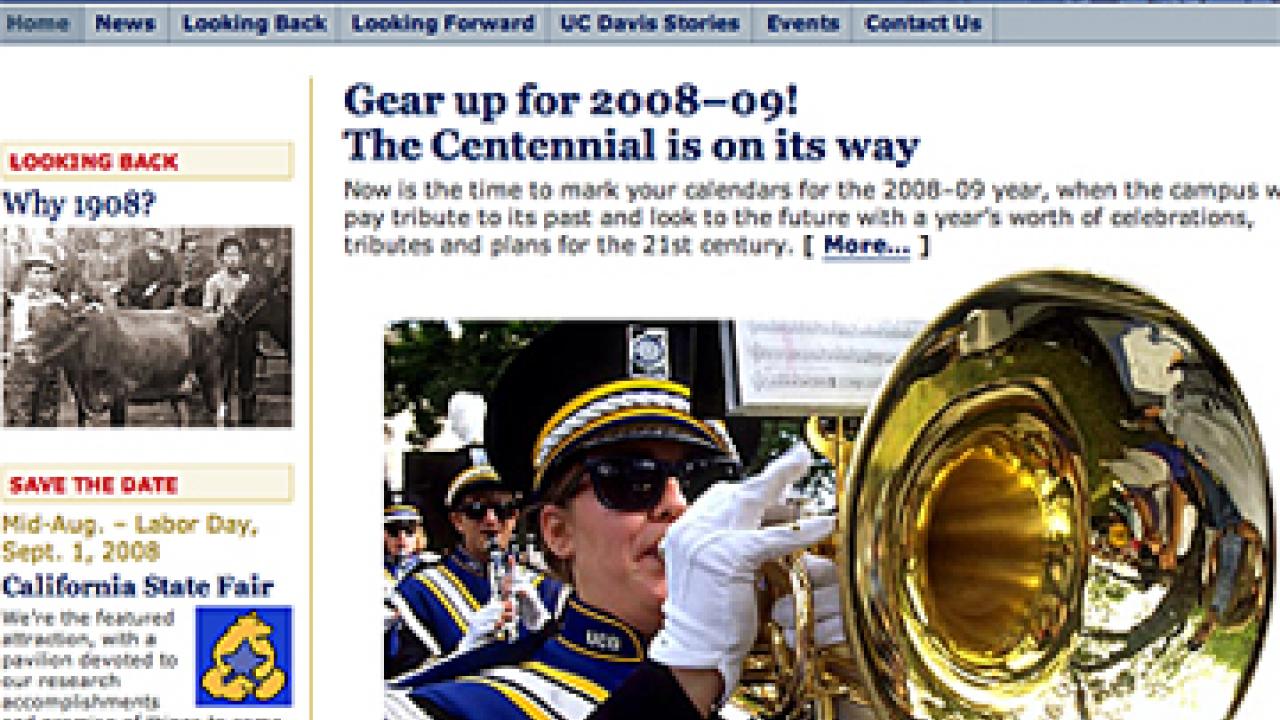UC Davis has been nearly 100 years in the making, and now is the time to mark your calendars for the 2008-09 centennial, when the university will pay tribute to its past and look to the future.
The yearlong event will be much more than just a party or celebration. Campus officials hope the event will help boost the overall profile and stature of UC Davis and reinforce and expand the connections between the campus and all its constituents, including alumni, friends, students, faculty, staff and neighbors.
To that end, UC Davis on Friday unveiled a new centennial Web site, at http://centennial.ucdavis.edu. The Web site will help visitors keep track of news and events and help them make the important connections between the campus's second 100 years and its impressive, first century of achievement.
Among the headliner events: next year's California State Fair at Cal Expo in Sacramento, where UC Davis will be the featured attraction. The campus will fill a 6,000-square-foot pavilion with all things UC Davis, showcasing modern research projects such as alternative-fuel transportation and the promise of things to come.
Fairgoers can also expect to see some campus history, like the legendary Blackwelder harvester -- the UC Davis engineering feat that arguably saved California's processed tomato industry.
Indeed, while the United States had its Founding Fathers, UC Davis had its Founding Farmers. Not just any farmers, but men and women who knew something about biology, business, mechanics, animal husbandry, land stewardship, water, history, politics and community-building.
"At the University Farm in 1908, success in agriculture required a broad range of knowledge," said Assistant Vice Chancellor Bob Segar, touting the interdisciplinary roots that blossomed into today's UC Davis with its world-class programs in environmental sciences, engineering, management, the arts, law, viticulture and enology, life sciences and many more.
Charlie Roddy, assistant vice chancellor for alumni relations, described the centennial as "the ultimate homecoming" and said the Cal Aggie Alumni Association is assembling an alumni leadership team for centennial participation. Of course, the celebration will be for faculty and staff, too; for the city of Davis; and, for the entire Sacramento region and for all of California; and for students, including those who enroll in 2008-09.
The Centennial Class will number about 5,000, compared with the 109 men and women who attended the first courses in fall 1908 and arranged for room and board in town. The first residential class, in January 1909, numbered 18 -- all men, because the North Hall dormitory had not been designed to accommodate women. (North Hall is still standing, now a home for a variety of student services; it is next to South Hall, built in 1912 as a dorm and since converted to house student services, too.)
With a charter faculty of 16 regular instructors from UC Berkeley's College of Agriculture and 12 nonresident instructors, UC Davis launched a century of contributions to state, national and global agricultural progress.
But the Founding Farmers did so much more than work the land.
"Agriculture is the original interdisciplinary profession," said Segar, the university's chief centennial planner. The Founding Farmers meshed the sciences, looking for ways to improve social and economic conditions and environmental health. This interdisciplinary approach has survived -- and thrived -- as one of the university's founding values for all Aggies past, present and future.
Today, UC Davis can boast of an enrollment of 30,000-plus students, more than 8,200 faculty, nearly 21,000 staff and a nearly centurylong commitment to public service. "We are a university with an unusual dedication to building strong communities and solving real-world problems," said Chancellor Larry Vanderhoef. "Our first century, in fact, was built on that premise, and our next will surely continue to fulfill that promise."
UC Davis is well known for its contributions to the community through the UC Davis Health System and organizations such as Human Corps, a clearinghouse for student volunteer activities. "One of our centennial goals is to provide students, faculty, staff and alumni with increased opportunities to get involved in service projects," said Segar.
But while the projects will be local, the centennial also will be a time to highlight UC Davis' service to the state, nation and world -- from battling West Nile virus and avian influenza, to improving California's air quality and preserving Lake Tahoe's water quality, to assessing and warning about the pollutants swirling around rescue workers at the World Trade Center, and fighting malaria in Africa.
"Now, more than ever, we're solving problems that people care about, making a positive difference in people's daily lives," Segar said.
For more information about the UC Davis Centennial, including the California State Fair exhibition and other scheduled events, please go to http://centennial.ucdavis.edu.
Media Resources
Mitchel Benson, (530) 752-9844, mdbenson@ucdavis.edu
Julia Ann Easley, 530-752-8248, jaeasley@ucdavis.edu
